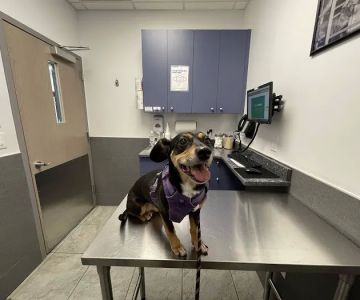What Is the Major for Being a Veterinarian?
Becoming a veterinarian is a dream for many animal lovers, and for those passionate about animal care, it's the ultimate career path. But what exactly does it take to become a veterinarian? One of the first steps is choosing the right major, which is a critical part of your education. If you're considering a career in veterinary medicine, this article will guide you through the major you should pursue and the educational requirements to reach your goal.
1. Understanding the Role of a Veterinarian
Before diving into the specifics of the major for becoming a veterinarian, let’s take a moment to understand the role of a veterinarian. Veterinarians are medical professionals who diagnose and treat animals for various conditions, from routine check-ups to serious illnesses. They work with a wide range of animals, from household pets like dogs and cats to farm animals, and sometimes even exotic species in wildlife preservation.
Veterinarians can specialize in different fields, including surgery, dermatology, emergency care, or even wildlife conservation. The work involves not only providing medical care but also educating pet owners and communities about animal health, disease prevention, and well-being.
2. The Ideal Major for Veterinary School
Now that you know what a veterinarian does, let's talk about the ideal major for veterinary school. While the specific undergraduate degree you earn is not as important as some might think, there are certain majors that will better prepare you for veterinary school. The most common majors for aspiring veterinarians include:
- Biology: This is one of the most common majors for students who want to become veterinarians. A degree in biology will give you a strong foundation in the sciences, covering subjects like genetics, physiology, and microbiology.
- Chemistry: A solid understanding of chemistry is essential for veterinarians, particularly when dealing with pharmaceuticals, medications, and understanding the biochemistry of animals.
- Animal Science: Many veterinary students choose animal science as their major because it provides specific knowledge about animal behavior, anatomy, and nutrition.
- Pre-Veterinary Studies: Some universities offer pre-vet programs that combine aspects of biology, chemistry, and animal science, providing a streamlined approach for those who are certain about their veterinary career path.
Regardless of the major you choose, it is essential to include coursework in biology, chemistry, physics, and mathematics. These subjects will help you meet the prerequisites for veterinary school, which is highly competitive and has rigorous academic standards.
3. Prerequisites for Veterinary School
After completing your undergraduate degree, you will need to apply to veterinary school. The requirements for veterinary school admission vary depending on the school, but they typically include the following prerequisites:
- Coursework: Most veterinary schools require a certain number of hours in specific courses such as animal biology, organic chemistry, physics, and mathematics. Having a strong academic record in these courses is vital.
- Veterinary Experience: Admissions committees look for candidates who have hands-on experience working with animals. Volunteering or working in animal shelters, veterinary clinics, or farms is a great way to gain this experience.
- GRE Scores: Many veterinary schools require the Graduate Record Examination (GRE) scores as part of their admissions process. A good GRE score can strengthen your application.
- Letters of Recommendation: Strong letters from professors, veterinarians, or employers who can speak to your abilities and passion for the field are critical to your application.
4. The Path to Becoming a Veterinarian
The journey to becoming a veterinarian typically involves several stages, each building upon the last. Here’s an overview of the general path you’ll follow:
- Undergraduate Degree: Your first step is to complete an undergraduate degree. Although many students choose biology or animal science as their major, it’s important to ensure that you meet the required coursework for veterinary school admissions.
- Veterinary School: After earning your undergraduate degree, the next step is to apply to veterinary school. Veterinary school typically takes four years to complete and includes both classroom learning and practical clinical experience.
- Licensing: After graduating from veterinary school, you’ll need to pass the North American Veterinary Licensing Examination (NAVLE) and meet any state-specific licensing requirements to practice as a veterinarian.
- Specialization (Optional): Some veterinarians choose to specialize in a particular field, such as surgery or dermatology. Specializing usually requires additional training and certification after completing the general veterinary degree.
5. Real-Life Example: A Day in the Life of a Veterinarian
To give you a better idea of what being a veterinarian is really like, let’s look at the story of Dr. Sarah Johnson, a small animal veterinarian in Augusta, Georgia. After completing her undergraduate studies in animal science, Dr. Johnson entered veterinary school at the University of Georgia, where she spent four years in rigorous training.
Dr. Johnson shared, “Veterinary school was challenging but rewarding. It taught me how to think critically about animal health, diagnose conditions, and provide treatments. It also taught me the importance of communicating with pet owners, which is just as important as the medical care we provide.”
Today, Dr. Johnson works in a clinic where she performs routine check-ups, emergency surgeries, and even educates pet owners on preventive care. “What I love most about being a veterinarian is knowing that I’m helping animals live longer, healthier lives, and that the work I do has a direct impact on the well-being of pets and their families,” she says.
6. How to Take the First Step Toward Becoming a Veterinarian
If becoming a veterinarian is your dream, the first step is to pursue the right undergraduate degree. Whether you major in biology, animal science, or a pre-veterinary program, you’ll need to take courses that align with the prerequisites of veterinary schools. But the key to getting accepted into a veterinary program is passion, dedication, and hands-on experience with animals.
As you move forward in your studies, don't forget to network with professionals in the field, volunteer at animal clinics, and seek internships to build a strong portfolio. You’ll need every bit of experience to make your application stand out in the competitive world of veterinary admissions.











